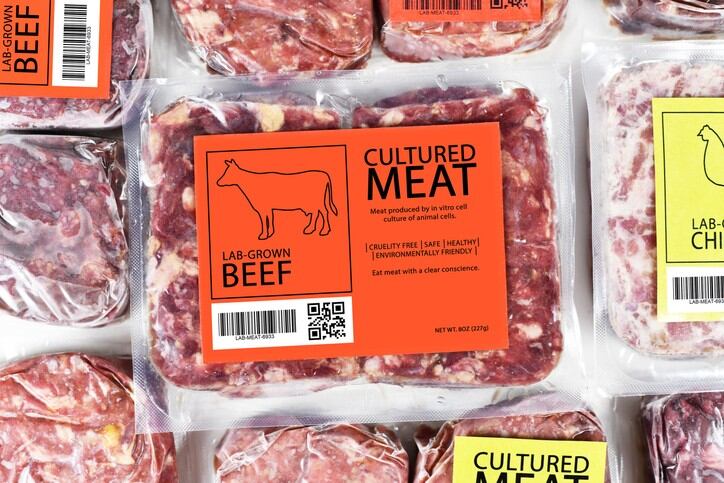‘No innovation, no future’: Yili says digital technology a key driver for aggressive NPD strategy
China dairy giant Yili has highlighted the use of digital technology all through its supply chain as a key factor for its new product development, having aggressively expanded its dairy portfolio in the past year.
Yili recently announced what it dubbed the ‘Innovation Trilogy’, stressing that it would be placing added focus on digital transformation, integrating resources to build an innovation system, and driving product innovation with technological R&D.
In line with this, digital technologies have been applied to ‘all procedures and operations from breeding to product consumption’ within the firm so as to create a ‘truly future-oriented digital organisation’, according to Yili Group Assistant President Dr Yun Zhanyou.
“[One major area of focus is] to empower innovative products with digital technology – for example Yili’s NOC (Nature Of Cheerfulness) ice cream which caused an online sensation [and] is very sought after,” Dr Yun told FoodNavigator-Asia.
“[In creating this], we conducted an intelligent semantic analysis based on public opinion data, which indicated that consumers are discussing a lot more about the ‘crust’ of ice cream, and the ‘carrot’ flavor was highly rated."
Salt reduction findings: Reducing daily intake by four grammes most effective in reducing CVD risks: 30-year modelling study
Reducing salt intake by four grammes a day has the biggest impact in reducing stroke and heart attack risks. according to a study modelling the effects of different interventions and population groups across a 30-year period in Singapore.
Based on the study's results, a 4g/day reduction in salt consumption was most effective when implemented across the entire population, resulting in 24,000 averted incident cases of cardiovascular disease over 30 years.
When targeted at specific high-risk demographic groups, the largest effects were observed in the overweight and obese, with the same intervention (4g/day) yielding 10,500 averted incident cases of cardiovascular disease (3,000 AMI, 7,500 stroke).
From these results, the implementation of a 4.0 g reduction in daily salt intake population-wide averted the greatest incidence for stroke and AMI, with the effect most prominent in the overweight population.
“Should a population-wide intervention be unfeasible, however, a 4.0g reduction in the overweight would be highly effective,” researchers said.
Post-pandemic supply chains: Collaborative and tech-focused strategies only way forward for Australia’s F&B logistics
Australian food and beverage firms will need to snap out of pre-COVID-19 thought processes when it comes to supply chains and logistics and embrace more collaborative and tech-focused strategies, according to an industry expert.
Food and beverage supply chains in Australia were amongst the hardest-hit last year due to a high dependence on international passenger travel, which all but collapsed when the COVID-19 pandemic hit.
“COVID-19 taught us some very painful but important lessons about the vulnerabilities in our food supply chains and our dependence on global trade, reminding us of the need for more resilient, agile, purpose-driven supply chains,” Deakin University Industry Professor and Director of the Centre for Supply Chains and Logistics (CSCL) Dr Hermione Parsons said at the recent Food South Australia Summit.
“[One of these vulnerabilities was seen when] the collapse of international flights caused a major disruption for [Australian firms] exporting high-value exports due to a long-term reliance on spare cargo space in passenger planes at a very discounted pricing.
“[Post-pandemic], people should not be relying on freight rates returning to what they were previously – Australia has a tyranny of distance, which was only overcome previously by having the third-most travelled people worldwide using airlines, but now these airlines have realized [the value of their] cargo space and how heavily discounted these were to export goods, so things are not going back to before and we need to look at other possibilities.”
Plant-based meats and health: Pinduoduo and SIFBI team up to study impact on different ethnic groups in Singapore
China’s agriculture and grocery retail platform Pinduoduo and the Singapore Institute of Food and Biotechnology Innovation (SIFBI) have signed a research project agreement to study the impact of plant-based meats on human health in the Singapore population.
Unlike other research which broadly cover the health impact of plant-based diets, this study is the first of its kind focusing on novel plant-based meats.
The study will assess the nutritional and health impact of replacing traditional animal protein with plant-based protein, and whether different ethnic groups respond differently to these plant-based proteins.
As these novel foods become more commonplace, consumer education and information about nutrition also needs to keep up.
Farm to consumer: Strong demand for vegetables and fruits on Duo Duo Grocery using Pinduoduo’s patent-pending cold-chain logistics system
Duo Duo Grocery (DDG), the next day grocery delivery service by China’s largest agriculture platform Pinduoduo (PDD) is seeing strong demand for fresh fruits and vegetables thanks to its patent-pending cold-chain logistics system.
DDG was launched in August 2020, to complement the main PDD platform. It can be accessed from the homepage of PDD, and sells products including fruits, vegetables, dairy, beverages, grains, cooking oil, snacks and household necessities.
Preston Zhang, executive director of corporate development at Pinduoduo told FoodNavigator-Asia, the launch of DDG was inspired by a shift in consumer habits.
“During COVID-19, consumers had increasingly turned to buying groceries online due to inconveniences and concerns about shopping in crowded wet markets. This habit stuck even as lockdowns were lifted and our partners were overwhelmed by the volume of orders over that summer.
“DDG is our way of making online grocery shopping even better, faster, and more affordable for our users. A next-day grocery self-pickup service, DDG functions on a localised distribution model in which farmers and grocery merchants can sell directly to users in the region.”





